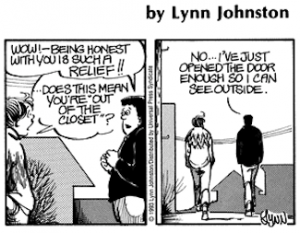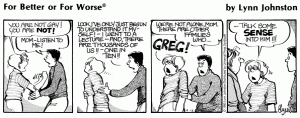 In 1993, Lynn Johnston ran a four-week story in her comic strip, For Better or For Worse, about Michael’s long-time best friend, Lawrence Poirier. Lawrence was gay, and he came out to Michael, his parents, and readers around the world (http://www.fborfw.com/features/lawrence/index.php). Johnston rocked the world with the forthright manner in which she addressed this still sensitive issue. During a time when the world was still reeling from the introduction of HIV/AIDS, still then commonly thought of as “gay cancer,” and the first exploration into antiretroviral cocktails, there was more than a little negative reaction both in the strip and in real life.
In 1993, Lynn Johnston ran a four-week story in her comic strip, For Better or For Worse, about Michael’s long-time best friend, Lawrence Poirier. Lawrence was gay, and he came out to Michael, his parents, and readers around the world (http://www.fborfw.com/features/lawrence/index.php). Johnston rocked the world with the forthright manner in which she addressed this still sensitive issue. During a time when the world was still reeling from the introduction of HIV/AIDS, still then commonly thought of as “gay cancer,” and the first exploration into antiretroviral cocktails, there was more than a little negative reaction both in the strip and in real life.
We get to watch a few different reactions to Lawrence’s confession. When Lawrence first tells Michael , he faces rejection even from his best friend. It’s not more than two strips before Michael comes around and tries to convince Lawrence to tell his mom, but not all friends come around in the end. A gay person’s fear of losing all their friends, all their support simply because they put words to an aspect of themselves that had been a private, if tumultuous, experience is all too real.
, he faces rejection even from his best friend. It’s not more than two strips before Michael comes around and tries to convince Lawrence to tell his mom, but not all friends come around in the end. A gay person’s fear of losing all their friends, all their support simply because they put words to an aspect of themselves that had been a private, if tumultuous, experience is all too real.
When Lawrence comes out to his mom, things take a turn for the worse, when she demands her (relatively new) husband “talk some sense into him!”  Who then throws Lawrence out in the middle of the night. Greg’s comment about Lawrence’s “kind” not being welcome in the house is rhetoric all too often used, including in schools. When a person is referred to as being a “kind” of person is inherently dehumanizing. They have now become nothing more than a statistic, at best, and a head to be counted or culled as the speaker sees fit. In the context of a queer “kind,” more often than not it is coming from those who would prefer they never see us again, and we go to “special schools for [our] kind,” where the gay may or may not removed.
Who then throws Lawrence out in the middle of the night. Greg’s comment about Lawrence’s “kind” not being welcome in the house is rhetoric all too often used, including in schools. When a person is referred to as being a “kind” of person is inherently dehumanizing. They have now become nothing more than a statistic, at best, and a head to be counted or culled as the speaker sees fit. In the context of a queer “kind,” more often than not it is coming from those who would prefer they never see us again, and we go to “special schools for [our] kind,” where the gay may or may not removed.
Johnston talks about the story behind the story in the introduction of the collection “There Goes My Baby,” also posted online (http://www.fborfw.com/features/lawrence/index.php). She talks briefly about the why the character Lawrence is gay, but mostly the response she got from people in Canada and the US (mostly the US). Johnston makes a point to say that, while the initial reaction was extremely negative and sometimes hurtful, by the end of the storyline, “more than 70 percent” was supportive of not only her character, but his revelation, reveal, and the reactions around him. Johnston told a good story — and a true story.
Johnston states she thinks the reason for the delay in the positive responses and outpouring of support for her story lies mostly in those waiting to see what happened. For a huge number of LGBT youth and adults, they face rejection from their families, if not outright abuse from any number of people around them. They waited to see how Lawrence’s story would be treated. We can surmise they wanted to see how Johnston treated Lawrence himself, but also how she treated those around him — and how they treated him. While Lawrence is lucky enough to get a ending with understanding, thought it’s not necessarily “happy,” such is not always the case for those coming out to their families. But this one story can give them hope.
